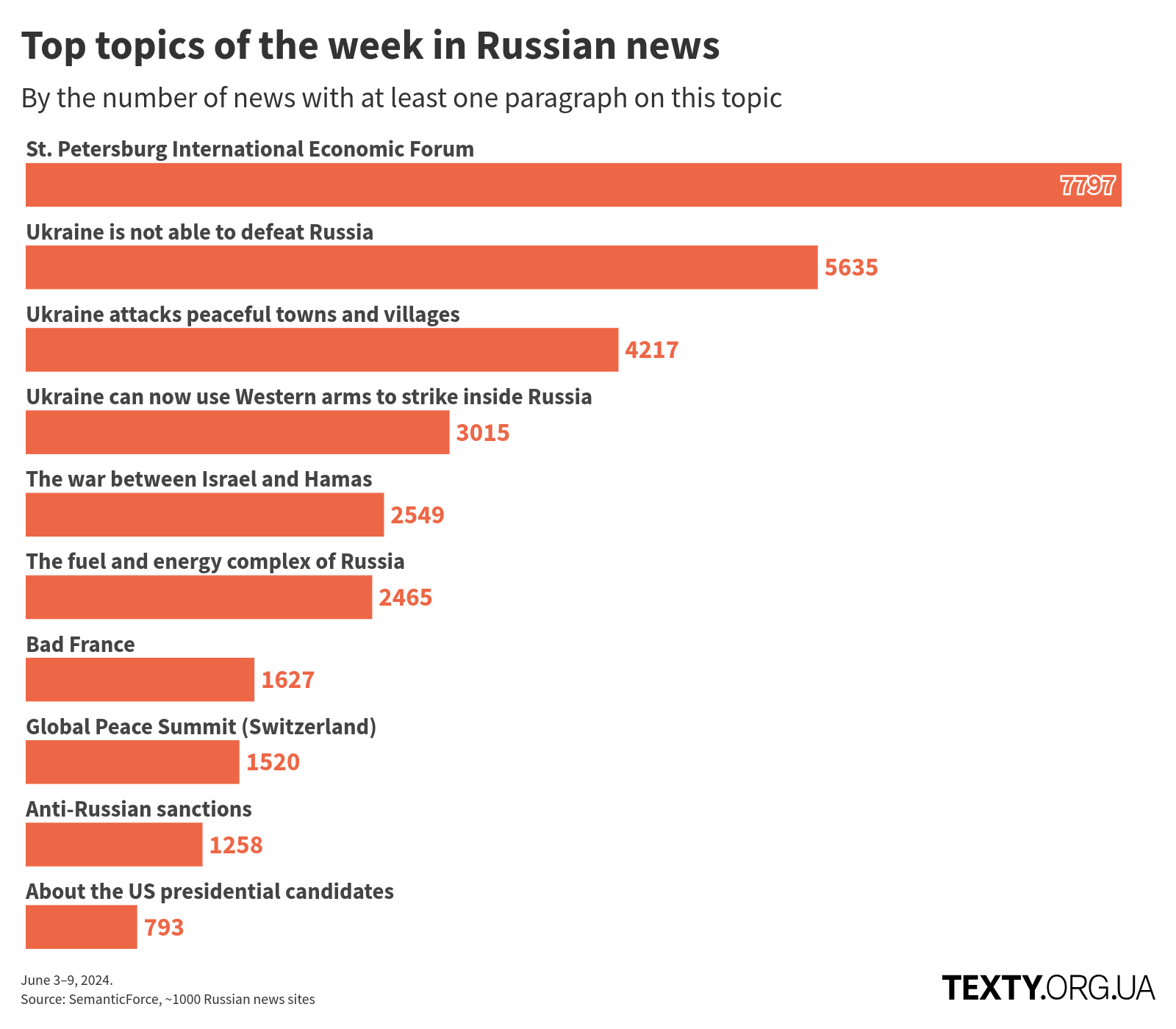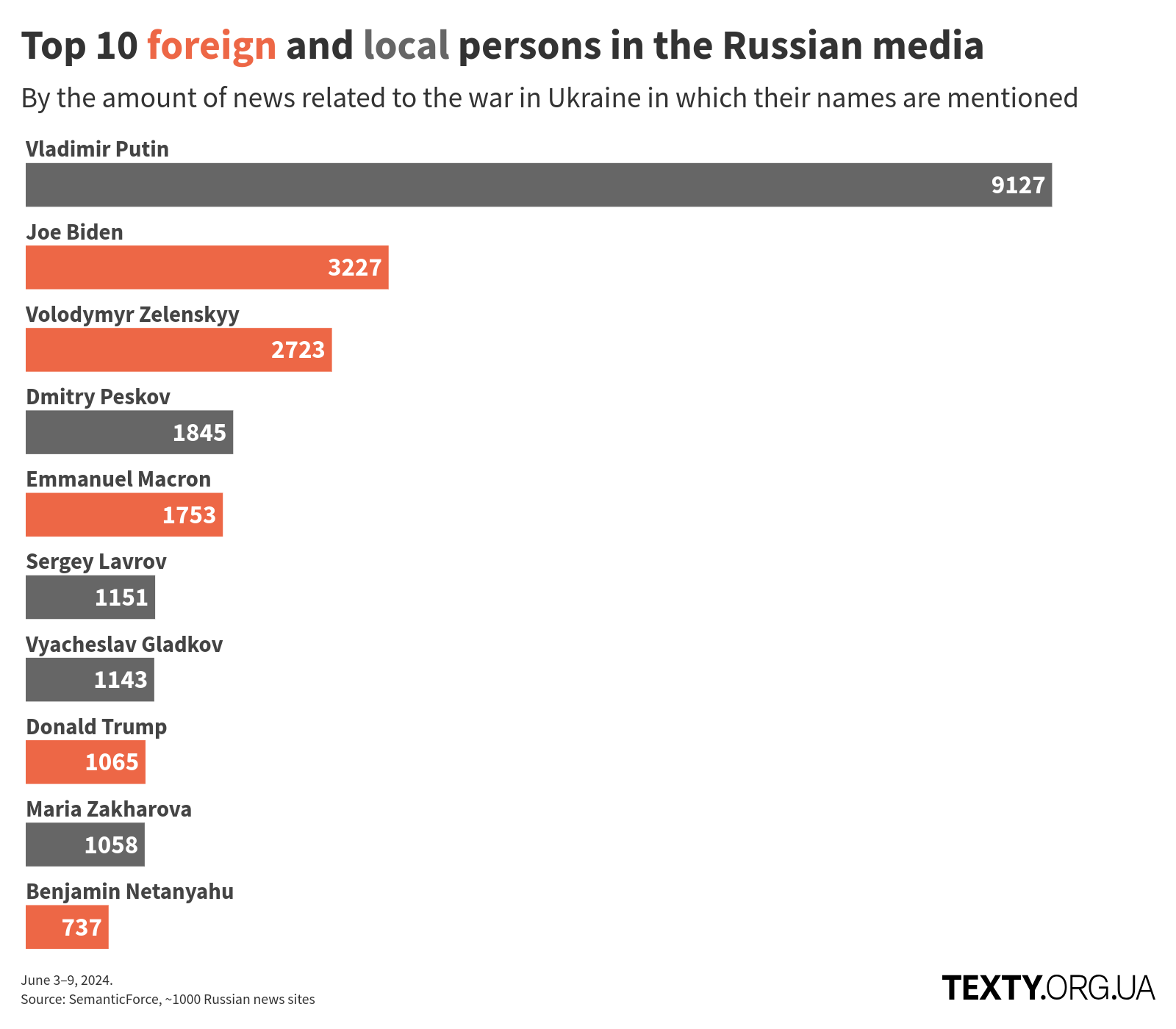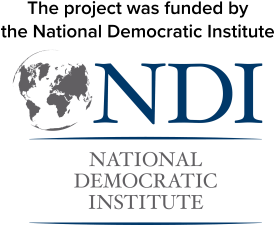Witches' Sabbath in Petersburg. Russian Media Monitoring Report, June 3–9, 2024
Last week, Russian media covered the work of the St. Petersburg International Economic Forum (SPIEF). The forum was supposed to be the main business event of the year in Russia and prove that Russia is not lagging in international affairs and is still attractive to guests, investments, and developments. Despite propaganda efforts, SPIEF turned out not to be so international. The organizers even created fake national delegations. Moreover, the term "economic" was not always justified. Speakers talked more about nuclear weapons, traditional values, the role of the family, and Russia's unique path. They also criticized the West for gay propaganda and the desire to impose its will on others.
Read about this and more in the latest issue of our monitoring of Russian state media and manipulative sites that deliberately spread Russian disinformation.

International Economic Forum
From June 5–8, Russia hosted the so-called St. Petersburg International Economic Forum (SPIEF), where Vladimir Putin was among the speakers.
It is called "so-called" because the international representation was minimal, and the speakers' statements often deviated from economic topics. The Forum became a platform for pushing propagandist ideologies, praising traditional values, and discussing nuclear weapons.
Attendee Composition. The organizers claimed that "this year, 21,800 people from 139 countries and territories participated in the Forum's events. The significant presence of numerous foreign delegations and business representatives once again confirmed that Russia is not isolated internationally. The Forum gathered representatives from countries wishing to develop their economies within the paradigm of a just and multipolar world."
Disinformers are trying to prove that Russia is not isolated.
The attendees in St. Petersburg included Zimbabwe's President Emmerson Mnangagwa, Bolivia's President Luis Arce, the "president" of the unrecognized Abkhazia Aslan Bzhania, and representatives of the ruling Taliban movement in Afghanistan.
However, this scale is not comparable to previous years. In different years (before the occupation of Crimea), forum guests included former German Chancellor Angela Merkel, former Japanese Prime Minister Shinzo Abe, French Presidents Nicolas Sarkozy and Emmanuel Macron, and Chinese leaders Hu Jintao and Xi Jinping.
Today, the organizers had to "imagine" some international delegates. For example, there was a so-called delegation from Moldova: "Russian media reported the arrival of a Moldovan delegation at the St. Petersburg International Economic Forum and the opening of the country's stand, whose government takes a pro-European position." In reality, there was no official Moldovan delegation at SPIEF. The group of people whom the Russian media presented as a delegation was led by a person who lives in Chisinau but actively works in Russia as a toastmaster. The "delegation's" stand was set up by the organization of the owner of a Moldovan restaurant from Yaroslavl.
Forum Content and Discussions. This year, "the main theme of SPIEF was 'The Foundation of a Multipolar World: Creating New Growth Points.' Speakers and experts discussed, among other things, key trends and development prospects for the Russian and global economies."
While some speakers did talk about the economy, the main trend was set by Putin and his henchmen propagandists. Putin's speech lasted "exactly one hour," and the propaganda claims it ranked "among the top three most extensive speeches by the head of state at SPIEF over the years."
Vladimir Putin accused the United States and once again asserted Russia's peacefulness: "At the same time, countries that were recently leaders of global development are trying by all means, fair and foul, to maintain their waning role as hegemons."
Other statements by the autocrat included:
- "China has become the world's number one economy, far ahead of the second place," hinting that Russia's economy will be fine as long as it has such allies. Meanwhile, the U.S. and Europe will face economic stagnation.
- "Russia remains one of the key participants in global trade, despite all obstacles," again claiming that sanctions do not work.
- "Russia has record-low unemployment—in April, it was 2.6%. Now the main question is not 'where to find a job,' but 'where to find workers'." Indeed, given the deployment of people to war, there is now a shortage of workers.
- "Russia plans to enter the top 10 world leaders in scientific development within six years. The state will increase spending on scientific research to at least 2% of GDP," but Moscow has to buy most of the necessary products and components from China.
- "Many domestic entrepreneurs support the Special Military Operation (SMO), send their products, buy goods and equipment, and help hospitals."
- "We [Russia] have set the goal of becoming one of the four largest economies in the world."
This forum can be characterized as a parade of fakes, incitement of hatred, and flattery towards Putin.
The moderator of this year's "plenary session" with Putin was political scientist-propagandist Sergey Karaganov. He is the author of articles calling for a preemptive nuclear strike on European countries to "break the West's will to aggression" and save humanity from a "global catastrophe."
Karaganov stated that Putin must save the world and called for more active use of nuclear weapons: "Of course, it is probably too early to go for nuclear escalation now, but we need to move towards it to cool our opponents. They have gone mad, especially the Europeans. They are practically at war for the third time in a hundred years. The Americans are much more cautious; they have fed the Ukrainians and pushed them, but they are much more cautious themselves. But the Europeans are at war."
In this case, Putin played the role of the good cop who refuses to use nuclear weapons: "Putin warned that one cannot be reckless with the issue of using weapons of mass destruction. He also added: the West believes that Moscow will never use them, but according to the nuclear doctrine, if the sovereignty and integrity of the country are threatened, all means are permissible."
Top propagandist Margarita Simonyan added spice to the discussions by claiming that in German preschools, three-year-old children are shown gay porn and provided with masturbation rooms.
Needless to say, this is a lie intended to discredit Europe and praise Russia's unique path. After all, Russia is a "civilization-state," and lately, propaganda emphasizes this more and more.

European Parliament Elections
From June 6–9, elections to the European Parliament took place. Centrists won, but Moscow is rejoicing.
The far-right, including so-called friends of Putin, made significant gains, while the Greens, particularly in Germany, who oppose Russia, lost: "In many EU countries, including Germany, the ruling parties suffered a complete defeat in these elections. According to preliminary results, the overall balance of power among the supranational political groups or factions in the European Parliament will remain almost unchanged, with one exception—the Green's ratings plummeted."
Speaker of the State Duma Vyacheslav Volodin spoke of "Europe's disgrace": "Macron and Scholz lost spectacularly." He directly linked Macron and Scholz's loss of positions to their support for Ukraine: "The results in France and Germany were predictable. The economy is stagnating, there is a migration crisis, and countries are drawn into the war in Ukraine against their national interests. Macron and Scholz are clinging to power with all their might."
State Duma Deputy Leonid Slutsky stated that Europeans are tired of the US hegemony: "It was not so much an inertial vote for the 'party in power,' but a vote of no confidence in the adepts of the war for the hegemony of the collective West led by the USA. The real 'European majority' is tired of foreign battles. People want to live in their countries and in accordance with their national interests, not according to the rules of a large American colony. Their voices will now be louder."
Propaganda describes the vote as a protest against Russophobia in Europe.
Moscow closely watched the elections, dreaming of a change in European policy. Europe should stop supporting Ukraine and return to trading with Russia.
However, the centrists retained their leadership in the European Parliament. European Commission President Ursula von der Leyen, whose center-right European People's Party (EPP) won the European Parliament elections, stated that she aims to ally with pro-European and pro-Ukrainian political forces.
This disappoints the propagandists, but they are putting on a brave face. For years, disinformers have been pushing the narrative of the European Union's collapse, and the far-right's victory aids them in this information campaign. The Kremlin's information service claims that the anti-Russian bloc has weakened, and in the next national election cycles, Russia's friends might come to power and change the countries' positions.
The Methodology
To monitor the information published on disinformation websites, we analyzed approximately 500,000 news reports collected from ~ 1,000 Russian websites. The data for the analysis was collected and provided by SemanticForce.
Each paragraph was processed using an algorithm which defines its topic automatically. The resulting topics (i.e. groups with similar content) were short-listed by the topics relating to the war or its consequences for Russia. The number of mentions of a certain topic was then counted for each publication. Our conclusions are based on the respective findings and the quotes from paragraphs referring to each topic.
If you are interested in receiving an extended version of our monitoring report, please fill out this brief questionnaire.

This article was originally written in Ukrainian. It has been translated into English using AI tools such as DeepL, ChatGPT, and Grammarly. If you encounter an error that requires immediate attention, please inform us via Facebook, Twitter, or Instagram. Your understanding and support are appreciated.

